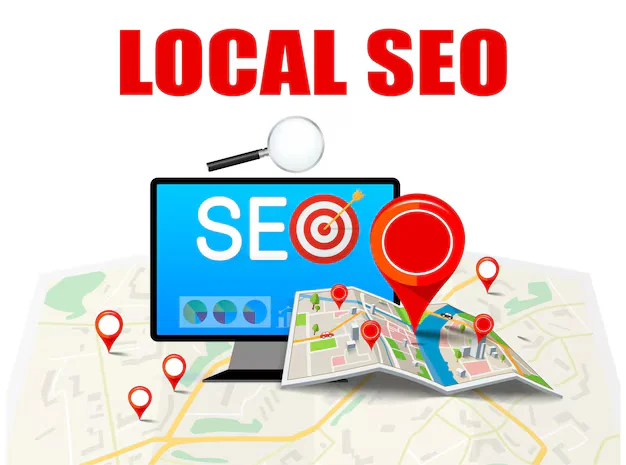
In today’s digital age, having a strong online presence is crucial for any small business. However, standing out in search results—especially when competing with larger businesses—can be a challenge. That’s where local SEO comes into play. For small businesses targeting customers in specific geographic areas, local SEO strategies can make a huge difference by improving your visibility in local search results and drawing in more local customers.
In this blog, we’ll walk you through actionable local SEO strategies to help your business appear in searches like “SEO services near me” and attract more foot traffic to your physical location or local website visitors.
What is Local SEO?
Local SEO is a type of search engine optimization that helps your business appear in location-based searches. For example, when someone types “best cafes near me” into Google, local SEO ensures that nearby businesses are displayed in search results, especially in the Local Pack (the map with three business listings).
Local SEO is crucial for businesses that rely on local traffic—whether you’re a small retail shop, restaurant, or service provider like an accounting firm. The goal is to help your business rank higher in search results for keywords that include local intent, like “SEO services near me” or “plumbers in [city].” This type of SEO can directly affect the number of customers who find and visit your business.
1. Optimize Your Google My Business (GMB) Profile
One of the most important steps in any local SEO strategy is optimizing your Google My Business (GMB) profile. This free tool helps your business show up in relevant local searches, including Google Maps. Here’s how you can improve your GMB profile:
- Ensure your profile is complete: Fill out all the fields, including business name, address, phone number (NAP), business hours, and service areas.
- Add relevant keywords: Keywords like “SEO for small businesses” or “digital marketing services in [city]” should appear in your business description.
- Encourage reviews: Positive reviews help boost your business’s visibility in local search results. Ask satisfied customers to leave reviews, and always respond to feedback—both good and bad.
By optimizing your GMB profile, you’ll improve your chances of appearing in local search results, driving more customers to your door.
2. Target Local Keywords Strategically
Local keyword optimization is the backbone of your local SEO strategy. Research keywords that include your location or service area, like “digital marketing services in India” or “SEO services near me.”
Here are a few steps to get started:
- Conduct keyword research: Use tools like Google Keyword Planner or SEMrush to find relevant location-based keywords.
- Incorporate keywords naturally: Use your chosen keywords in page titles, meta descriptions, headers, and body content. Avoid keyword stuffing, which can hurt your rankings.
- Create location-specific landing pages: If your business operates in multiple areas, create individual landing pages for each location. This helps target specific local searches.
By focusing on local keywords, you’ll boost your visibility in the specific areas you serve, ensuring that you attract more qualified leads.
3. Encourage Customer Reviews & Reputation Management
Online reviews play a significant role in local SEO. Google uses review signals to rank businesses in local searches, and potential customers are heavily influenced by positive feedback.
- Encourage reviews: Make it easy for customers to leave reviews by sending follow-up emails or providing a direct link to your GMB page.
- Manage your reputation: Always respond to reviews—whether positive or negative. This not only shows you care about your customers but also signals to Google that you’re actively engaged with your audience.
- Monitor reviews across platforms: Keep track of reviews on Yelp, TripAdvisor, and Facebook, as well as Google. The more positive reviews you have across platforms, the better your business will rank in local search results.
Handling reviews properly can enhance your business’s online reputation and improve your local SEO rankings.
4. Optimize for Mobile and Voice Search
As more people use smartphones to search for local businesses, optimizing your site for mobile is critical. More than 60% of all searches now come from mobile devices.
- Make your website mobile-friendly: Use a responsive design that adapts to different screen sizes. Fast loading times are also crucial, as users are more likely to leave a site that takes too long to load.
- Optimize for voice search: Voice search is growing in popularity, and optimizing for it is essential. Use conversational keywords and phrases like “SEO help for small businesses” or “best local SEO strategies” to capture voice search traffic. Focus on answering common questions that potential customers might ask.
With mobile and voice search optimization, your business will be well-positioned to capture more local searches on the go.
5. Leverage Structured Data and Schema Markup
Structured data, also known as schema markup, helps search engines better understand the content on your website. It provides additional context, which can improve your visibility in search results.
- Implement schema for local SEO: Use local business schema markup to tell search engines about your business name, address, phone number, hours, and services. This makes it easier for Google to display your business in local search results.
- Appear in rich snippets: Proper use of schema markup can help your website appear in rich snippets, which are highlighted search results that provide direct answers to user queries.
By using schema markup, you’ll enhance your business’s chances of being featured prominently in local search results.
6. Local Link Building Strategies
Building local links is another essential part of any local SEO strategy. Local backlinks, especially from reputable websites, can improve your website’s authority and boost your rankings.
- Collaborate with local businesses: Partner with other businesses in your area to exchange links or collaborate on content. For example, guest blog on a local website or sponsor local events.
- List your business in local directories: Ensure your business is listed in local directories like Yelp, TripAdvisor, and other niche-specific directories. Be sure that your NAP information is consistent across all platforms.
By building strong relationships and acquiring quality backlinks, your website will gain authority and rank higher in local searches.
7. Monitor Performance and Continuously Improve
Once you’ve implemented your local SEO strategies, it’s crucial to monitor your performance. Regularly tracking your progress will help you identify what’s working and where improvements are needed.
- Use tools like Google Analytics and Search Console: These tools provide insights into your website’s performance, including local traffic, keyword rankings, and user behavior.
- Track local SEO metrics: Keep an eye on metrics like search engine rankings for local keywords, Google My Business views, and conversions from local visitors.
By continuously refining your local SEO strategy based on performance data, you’ll stay ahead of the competition and maintain your rankings.
Conclusion
In today’s competitive market, local SEO is essential for small businesses looking to boost their online presence and attract local customers. By optimizing your Google My Business profile, targeting local keywords, encouraging customer reviews, and optimizing for mobile and voice search, you’ll position your business for success in local search results.
To succeed in local SEO, consistency and adaptability are key. Keep monitoring your performance and refine your strategies over time. Whether you’re a small business looking for SEO help or a company seeking to dominate local search results, these strategies will guide you to the top.
FAQs
- What is local SEO, and why is it important for small businesses?
Local SEO is a strategy that helps businesses appear in location-based searches. It’s essential for small businesses because it increases visibility to local customers, driving foot traffic and online leads.
- How does Google My Business improve local search rankings?
A complete, optimized Google My Business profile can improve your business’s visibility in Google Maps and local searches. Positive reviews and accurate business information also contribute to higher rankings.
- What are the best practices for optimizing my website for voice search?
To optimize for voice search, focus on natural language and long-tail keywords. Use conversational phrases that match how people speak and ask questions, and ensure your website is mobile-friendly.
- How do online reviews impact local SEO?
Reviews play a significant role in local SEO rankings. Positive reviews signal to Google that your business is reputable, which can improve your rankings. Responding to reviews also helps with engagement and customer trust.
- How can small businesses build local backlinks?
Small businesses can build local backlinks by partnering with other businesses, guest blogging, sponsoring events, and listing in local directories. These links improve domain authority and local SEO rankings.
Ready to boost your business’s online presence?
At The Aspiring CEO , we specialize in best SEO services and comprehensive digital marketing strategies tailored to your unique needs. Contact us today to learn how we can help your small business thrive in all search results and beyond!


